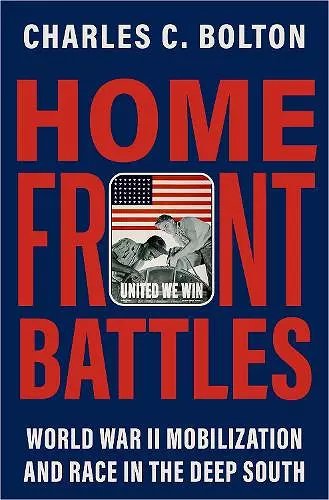Home Front Battles
World War II Mobilization and Race in the Deep South
Format:Hardback
Publisher:Oxford University Press Inc
Published:30th Sep '24
Currently unavailable, and unfortunately no date known when it will be back

This book explores the impact of World War II on the Deep South, highlighting economic changes, racial tensions, and the struggle for African American rights amidst wartime mobilization and social challenges.
Home Front Battles explores the significant impact of World War II mobilization on the Deep South, a region grappling with economic and social changes. As rural residents migrated to urban areas in search of war-related employment, tensions arose between wealthy landowners and laborers, particularly among Black tenants and wage workers who constituted a vital part of the workforce. The book highlights how towns like Pascagoula, Mississippi, experienced rapid growth due to increased demand for shipbuilding, resulting in the rise of powerful industrialists and setting the stage for long-term economic transformations.
The narrative delves into the federal government's attempts to address the social challenges that accompanied the influx of migrants, many of whom were unfamiliar with the evolving job landscape. A focal point of the book is the struggle against discriminatory practices, particularly following the passage of the Selective Training and Service Act in 1940 and the establishment of the Fair Employment Practices Committee in 1941. These initiatives aimed to promote nondiscrimination, but they often clashed with the entrenched racial dynamics of the Deep South, where longstanding traditions and tensions were deeply rooted.
The book also examines the political landscape during this period, showcasing the differing perspectives of white politicians, from liberal figures like Georgia's Governor Ellis Arnall to more reactionary leaders such as Mississippi's Senator Theodore Bilbo. As African Americans in the Deep South sought to exercise their voting rights in the unprecedented elections of 1946, they faced fierce opposition from white Southerners, who employed various tactics, including intimidation and violence, to suppress their efforts. Home Front Battles provides a comprehensive look at this tumultuous era, highlighting the intersection of race, politics, and economic change in the American South.
Homefront Battles is the best book ever written about life in the South during World War II. Charles C. Bolton gives us a fascinating, holistic view of the war's broad impact on Southern life, offering a refreshingly original take on the war's complicated effects and legacies across the region. * William Sturkey, Author of Hattiesburg: An American City in Black and White *
Charles C. Bolton's exhaustive research reveals that, like the New Deal programs preceding them, World War II mobilization initiatives in the South operated largely in accord with the interests of the dominant white beneficiaries of its prevailing economic, racial, and gender arrangements. The transformative potential was there, but, as in the 1930s, the political will was lacking once again. Bolton expertly demonstrates how the story of World War II on the southern home front came down not so much to continuity versus change as continuity within it. * James C. Cobb, Author of The South and America since World War II *
Throughout his history of the World War II years in the Deep South, Bolton is relentless in documenting how the region's white agricultural and business leaders, politicians, and newspaper editors worked against the Roosevelt Administration when mobilization in support of the troops threatened to destabilize the racial caste system that had come to define the South since Reconstruction. * Jere Nash, MS press *
...this book adds important information to readers' understanding of the region's change and continuity during the war. * Choice *
ISBN: 9780197655610
Dimensions: 249mm x 168mm x 43mm
Weight: 680g
384 pages